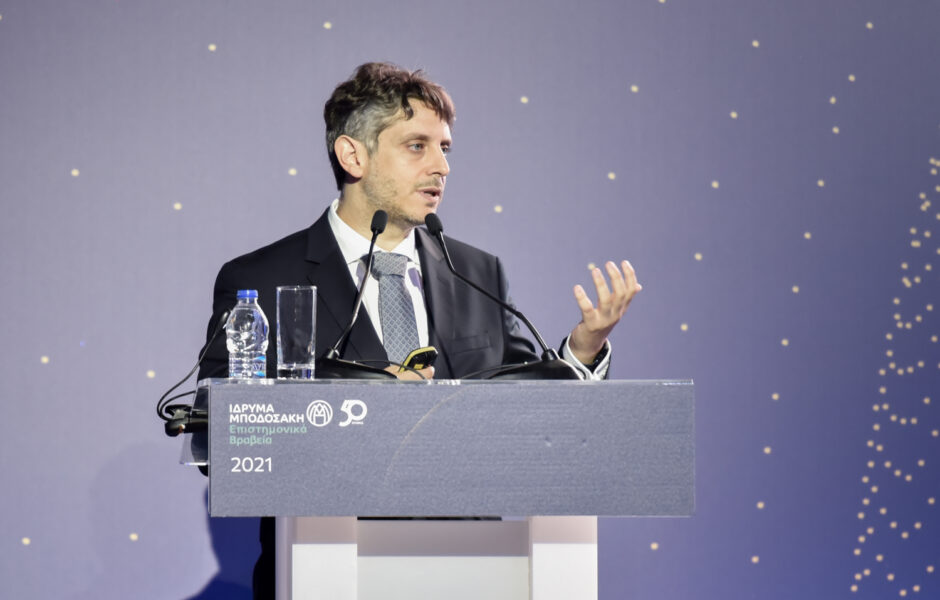Bodossaki Distinguished Young Scientist Award 2021
Academic field:
Science: Mathematics
“For me, the Bodossaki Distinguished Young Scientist Award is not only a great honour and recognition; it also represents a great responsibility, as it makes me part of a special community of scientists whose work has opened up new paths in scientific research. I look up to many of these scientists as role models. I greatly appreciate the approach of Bodossaki Foundation, which perceives scientific excellence as a collective ideal and not only as a personal achievement.”
********************
Themistocles Sapsis is Professor of Mechanical and Ocean Engineering at MIT. His research focuses on probabilistic theoretical characterization and prediction of extreme phenomena in chaotic systems, with applications in fluid mechanics and environmental flows.
He grew up in Athens and graduated from the 2nd Lyceum of Glyfada in 2001. That same year, he won third place in the Panhellenic Physics Competition and was awarded by the Association of Greek Physicists. In 2005 he completed his studies at the School of Naval Architecture and Marine Engineering of the National Technical University of Athens. By special decision of the Senate, he was awarded the diploma one year earlier than the foreseen five-year period of studies, with the highest grade ever in the School’s history (9.49/10). During the same period, he completed his diploma thesis on the stochastic analysis of dynamic systems with finite memory, under the supervision of Professor G. Athanassoulis.
In the summer of the following year, he went to the US on a presidential scholarship from MIT, where he worked on his PhD under the supervision of Professors G. Haller and P. Lermusiaux. The result of his doctoral thesis was the production of a new system of equations for the probabilistic modelling of non-linear chaotic flows. These equations were directly applicable in many scientific areas, including the prediction of oceanographic systems, the characterization of underwater acoustic properties, as well as the analysis of turbulent flows around solid bodies. After completing his doctoral studies in 2011, he worked as a mathematics researcher at the Courant Institute of Mathematical Sciences of New York University, with the leading mathematician A. Majda as his academic mentor. In 2012 he accepted MIT’s proposal to return as a professor, starting in 2013.
As a professor, Themistocles Sapsis focused on the creation of mathematical methods for the early prediction and analysis of rare but particularly destructive phenomena. The mathematical algorithms he has invented with his research team have been applied to physical systems, such as the prediction of catastrophic sea waves or extreme ocean oxidation values, the calculation of the frequency of extreme rainfalls or drought events, but also to mechanical systems, such as the prediction of helicopter wing flow detachment, and the extreme loads on warships.
He has received awards for his work by the research offices of all three branches of the US Armed Forces (by the Office of Naval Research in 2015, the Army Research Office in 2015, and the Air Force Office of Scientific Research in 2016), as well as by the Sloan Foundation. In 2020, he received the MathWorks Award for Research Innovation by MIT, while in the same year he was awarded the Verisk Analytics research scholarship. He is the recipient of several honorary distinctions for his research work, the most important among them being the Lloyd Hamilton Donnell Best Paper Award from the American Society of Mechanical Engineers (ASME).


